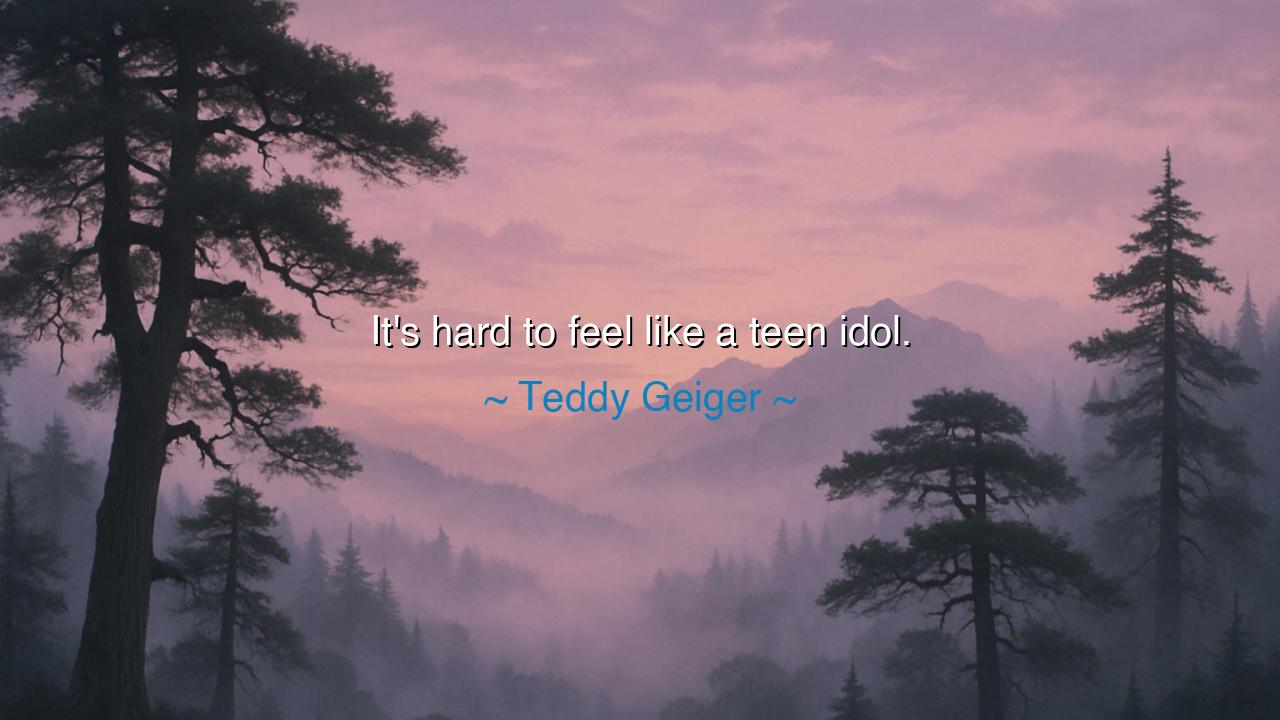
It's hard to feel like a teen idol.






When Teddy Geiger declared, “It’s hard to feel like a teen idol,” the words carried the weight of paradox. To the eyes of the world, the idol is exalted, placed upon a pedestal of adoration, showered with applause and praise. Yet within the heart of the idol, there often lives a hollow ache, a distance between the image projected outward and the truth beating inward. Geiger’s confession reveals this eternal tension: the difficulty of being worshiped for what others see, while struggling to feel authentic, human, and whole.
The teen idol is a creation not only of talent but of society’s desire. Youth, beauty, and charm are molded into a symbol, a figure to be adored. But symbols are fragile prisons for living souls. They demand perfection while denying vulnerability. To be cast as a teen idol is to have your very being transformed into a mirror for the hopes and fantasies of others. The applause is thunderous, but it drowns the quiet voice of self. Thus Geiger’s words remind us that fame, especially in youth, often costs more than it gives.
History has shown us many such stories. Consider the Roman gladiators, celebrated by roaring crowds in the Colosseum. To the masses they were heroes, embodiments of strength and valor. Yet within their hearts, many were slaves, forced into combat, longing not for glory but for freedom. The people saw an idol; the man felt only chains. In the same way, the modern teen idol may be adored outwardly while inwardly battling doubt, loneliness, and the crushing burden of expectation.
Geiger’s words also carry the sorrow of youth interrupted. The teen years are meant to be a time of discovery, of testing boundaries, of stumbling and learning in private. But the teen idol lives this journey on a stage, every misstep magnified, every moment of growth distorted by the gaze of millions. The idol is denied the ordinary struggles of youth, yet still endures them—only now under the judgment of strangers. What is hard, then, is not only the role of idolhood, but the theft of normality that comes with it.
And yet, within this confession lies a deeper teaching: that human worth is never the same as public adoration. To “feel like a teen idol” is difficult because the heart longs for authenticity, not illusion. True peace is not found in applause, but in alignment between who we are and how we live. Geiger’s words point us toward this wisdom—that even the most idolized may feel unseen, and that the path to wholeness requires turning inward, away from expectation and back toward truth.
The lesson for us all is simple and profound: do not confuse image with essence. The world may try to shape you into a role—whether idol, worker, parent, leader, or follower. But if that role silences your truth, it will never bring peace. Instead, honor your humanity. Allow yourself to be vulnerable, to be imperfect, to be real. The world needs your authenticity far more than it needs your performance.
Practical actions arise from this teaching. Guard your inner self against the weight of others’ expectations. Seek solitude and reflection, where you may listen to your true voice. Surround yourself with those who value not the idol but the person beneath. And if the world has placed you upon a pedestal, do not be afraid to step down, to show your true face. For only in this courage is freedom found.
Thus Teddy Geiger’s confession becomes not a lament but a beacon. To feel like a teen idol is hard, for idols are masks that weigh heavily upon the spirit. But to cast aside the mask and live in truth—that is the work of the strong, the wise, and the free. May future generations hear these words and remember: better to be fully human than to be worshiped as an illusion.






AAdministratorAdministrator
Welcome, honored guests. Please leave a comment, we will respond soon